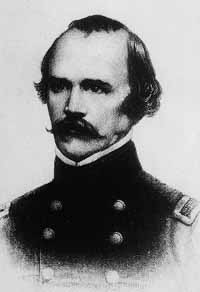
Albert Sydney Johnston
Albert S. Johnston was born February 2, 1803, at Washington, Kentucky. He attended Transylvania University before transferring to West Point, graduating 8th in his class in 1826.
After six years of peacetime soldiering, he resigned his commission to care for his dying wife, then moved to Texas to start over.
When Texas briefly declared its independence from the Union, he enlisted in the Army of Texas as a soldier, and became its chief commander, and Secretary of War within a year.
He commanded the 1st Texas Rifles in the Mexican War, reentering the U.S. Army after Texas was again annexed to the Union, serving as a Major.
He was promoted to Colonel of the 2nd Cavalry in 1855, and was promoted to Brig. General for his 1857 campaign against the Mormons in Utah.
At the onset of the American Civil War, he resigned his commission in the Union Army, but did not quit his post on the West Coast until his successor arrived.
In Richmond, Confederate President Davis made him the second most senior officer in the Confederate forces. He was given command over all of the armies west of the Alleghenies.
Establishing a line of defense in Kentucky from the Mississippi River to the Appalachians, he held it until it was broken at Mill Springs in January, and at Fort Henry and Fort Donelson in February of 1862.
Abandoning Kentucky and much of Tennessee, Johnston concentrated his forces in northern Mississippi.
Johnston was strongly criticized by the people of the South for his decision not to come to the aid of Fort Donelson, and for abandoning Southern positions in Kentucky and Tennessee. If not for the support of CSA President Davis, he would likely have been removed from his command.
He took the initiative against the Union forces and attacked Grantís forces at Shiloh. Taken by surprise, Grantís army suffered heavy casualties and may have been defeated if it were not reinforced by the arrival of General Buellís forces.
During the battle of Shiloh, Johston was wounded in the leg. Ignoring the wound, he continued fighting until he lost consciousness and subsequently died from loss of blood. This was a terrible blow to the Confederacy.